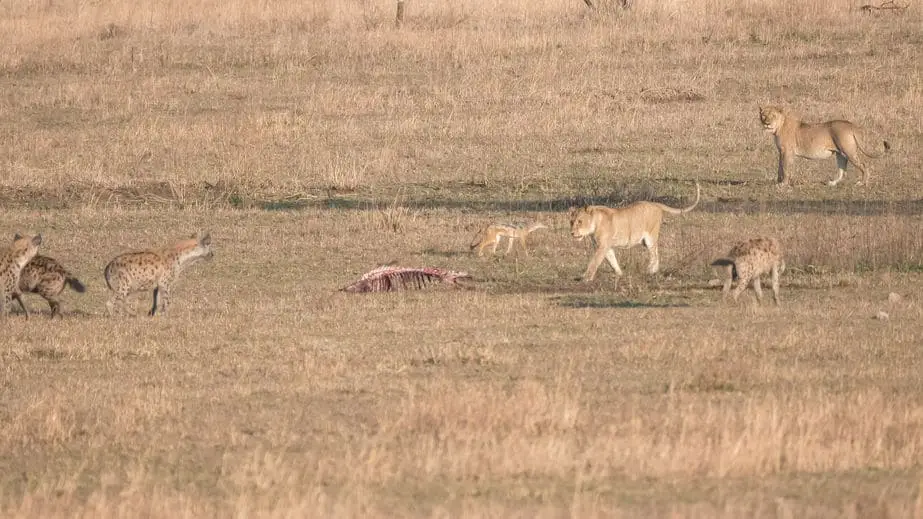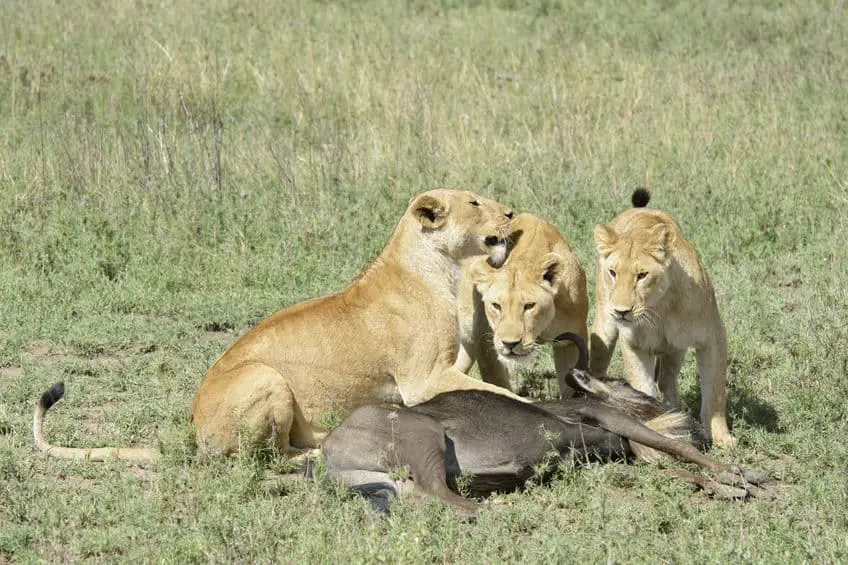
It is a well-known fact that lions do a significant amount of scavenging, but exactly how much of their food do lions acquire through scavenging rather than through hunting?
Lions generally acquire most of their food by hunting. They are, however, also known to scavenge and in some areas of Africa, lions acquire upwards of 50% of their food through scavenging.
Most people picture lions as strong and efficient hunters and while that is absolutely a true image, as you can see, they do a fair bit of scavenging as well. Below, I have covered exactly how much lions scavenge, why lions often scavenge instead of hunt, what lions go after when they scavenge, and how they do it.
How Much do Lions Scavenge?
Scavenging means finding (or stealing) animals that are already dead and eating them. Some animals do this as an alternative to hunting and some African animals, including lions, both scavenge and hunt.
Exactly how much lions scavenge depends on several things including their territory and what prey animals and other predators are in it and on the weather as this also affects their ability to hunt and the number of prey animals that are easy for them to find and catch.
Lions both hunt and scavenge. They generally hunt more than they scavenge, but the exact distribution varies greatly around different areas of Africa and depends mostly on the lions’ territories.
In some areas of Africa, lions rely almost exclusively on hunting and scavenging only makes up between 5% and 10% of their food sources. In other areas, however, lions scavenge upwards of 50% of all of their food
Although they are incredibly strong and perfectly competent hunters, male lions generally scavenge a larger percentage of their food than female lions which aligns perfectly with how they hunt where the female lions also do most of the work.
Male lions generally seem to enjoy having others do the work for them.
Why Do Lions Scavenge?
Despite being excellent hunters, scavenging is often simply just an easier way for lions to acquire food.
Part of what makes scavenging much easier than hunting is the fact that in some areas of Africa, lions’ success rate when it comes to hunting is actually quite low. Lions may have just one successful hunt out of thirty to forty attempts, so finding carrion that someone else has already caught or that may have even died on its own can be a much easier solution.
In other areas, however, lions’ success rate when it comes to hunting is much higher.
One reason why the success rate for hunting can be so different depending on the area is that in some areas, lions stay in much larger groups (called prides) than in other areas. Lions usually hunt together and the more members they have in the pride who can participate in the hunting, the easier it is to catch prey.
When given the choice, lions (especially the males) will almost always go for the easier option so when scavenging is an option, they will usually go for it.
In some parts of Africa, lions will mostly only hunt when they can’t satisfy their hunger by scavenging and stealing prey from other predators.
Scavenging is not always as straightforward as it may sound and there is quite often competition involved.
For instance, lions can meet competition from other scavengers such as spotted hyenas. Most of the time, a lion can easily overpower a hyena or even a few of them, but when there are a lot of hyenas and the lion is heavily outnumbered, the hyenas will be able to chase away the lion and claim the carrion.
Lions are much larger and stronger than other scavengers such as spotted hyenas and African wild dogs and other hunters such as cheetahs, so the lions will often be able to intimidate their opponent and thereby claim and steal their prey.
What Do Lions Scavenge?

Lions are not picky eaters. At all actually. Their diet can consist of almost any other African animals but they seem to thrive the most in areas that contain large populations of medium-sized or large herbivores such as zebras, wildebeests, Cape buffalos, Oryx, Impalas, and springboks.
Lions can even kill and eat very large mammals such as hippos, rhinoceroses, and young elephants. These types of prey, however, are rarer than the ones I listed before since their skin is extremely thick which makes it more difficult for the lions to both kill and eat them.
When it comes to scavenging, however, lions are even less picky than when it comes to hunting. They will go for more or less anything when scavenging. Even the large mammals such as elephants and rhinoceroses will be more than happily scavenged upon as they contain copious amounts of food.
When given the chance, lions will not hesitate to steal food from other hunters or scavengers.
Male lions are usually more greedy than the females when it comes to eating and they will generally make sure that they get to eat enough to become full before they let anybody else nearby.
When they have found or caught a large prey animal or in areas with abundant prey and plenty of food, the male lions will, however, sometimes let the females and the cubs eat right away.
The lionesses will usually let the cubs eat first.
How Do Lions Find Carrion?
Lions utilize several skills and strategies when it comes to scavening.
They are excellent at observing other hunters or scavengers and will for instance often go after the sound of a group of spotted hyenas who are fighting over some carrion.
Lions are usually able to chase hyenas away from carrions but if there are many more hyenas than lions, the lions will often not take the risk.
Lions will also often keep an eye on vultures high up in the air and watch where they strike down as this usually means that there is carrion nearby. Vultures are excellent at locating carrions and keeping an eye on them is a great way for the lions to know where to find an easy meal.
Vultures do not stand a chance against a large, hungry lion so when lions see a group of vultures, it usually indicates that they can have an easy meal with very little competition.
Sometimes lions will also steal from smaller hunters such as cheetahs or African wild dogs. Since lions are so much larger and stronger than them, stealing their kills is often an easy task. Like hyenas, however, African wild dogs sometimes stay in large groups that can cause trouble for a single lion.
Both cheetahs and African wild dogs will often consume their food rapidly to avoid losing it to larger predators such as lions so the lions have to be at the right place at the right time.
Oftentimes, lions don’t even have to steal their food from other animals and will simply be able to locate nearby carrions by the smell of them.
